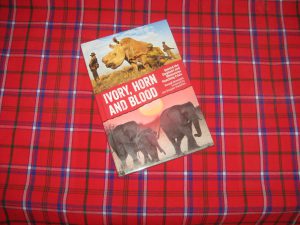Poaching and wildlife trafficking has not changed much since Ivory, Horn and Blood was published in 2013.
The carnage continues with the recent poaching of 87 elephants and several rhinos in  Botswana, and Feisal Ali Mohammed’s release from a Kenyan prison.
Botswana, and Feisal Ali Mohammed’s release from a Kenyan prison.
Written by Ronald Orenstein with the forward penned by Iain Douglas-Hamilton, the book is still relevant and a valuable resource.
The author is a zoologist, attorney and conservationist who has written a plethora of books on wildlife and birdlife. He is also a member on the board of directors with the Species Survival Network.
If you love rhinos and elephants, and their threatened wild existence is alarming, then this book is a must-read.
Orenstein combines meticulous research with shocking revelations into the senseless poaching epidemic. He delves into each species of rhino and elephant, eloquently explaining the history of each and why some species no longer exist, and why others are in extreme peril.
He shares his knowledge of CITES in an easy-to-understand chapter; and examines how the war on terrorism has impacted poaching, which he also comments on in this YouTube video.
**Based on new information, Dr. Orenstein has informed me that since the book was written and video filmed, the link between Al Shabaab and ivory poaching proved to be based on inaccurate reports. The role of organized crime (and, probably, at least some terrorist militias) on ivory poaching is, however, well-supported.**
Q&A with Dr. Orenstein:
1. Mary: The incidents involving rhinos and elephants that were portrayed in your book were truly horrific. Do you think that elephants and rhinos find themselves in a more precarious position now, than in 2012 when your book was penned? and why?
Ronald Orenstein: I am hoping, despite recent events in Botswana, that things are improving. If China and Hong King really enforce their planned ivory bans, and follow them up with public education campaigns, this could make a big difference. Also, the increased attention wildlife crime is getting at high levels is welcome. However, we certainly cannot afford complacency, and the pressure on Asian elephants may be increasing (including the population in Borneo).
Rhino conservation has not changed as much, and the big question is whether we can stave off the attempts by South African rhino breeders to re-open legal sales. I think we can, but you never know.
2. Over the years it was almost a given that the elephant herds in Botswana were thriving and growing. This past week it was reported that at least 87 elephants along with several rhino were discovered poached near the Okavango Delta. In April 2018 the new president was sworn in, a month later he disbanded the country’s anti-poaching unit with no explanation. We can only assume corruption. What is your feeling about this?
I wouldn’t be so quick to assume this, though it is certainly possible. I have yet to hear anyone suggest corruption, and had it been blatant I think I certainly would have. This could have been a misplaced austerity measure, and the government seems to realize it has made a serious mistake. We’ll have to see what happens over the next few weeks, and I expect to hear more at the CITES Standing Committee meeting in Russia next month.
3. I am sure you have been following the capture, trial then subsequent release of Feisal Ali Mohammed in Kenya. Given the controversy surrounding this, is there hope this guy will ever be brought back to justice? If not, what should be done?
On this I really have no inside information, but I suspect this relates to the whole issue of government corruption in Kenya and may depend on the wider consequences of this issue. I also do not know what provisions in Kenyan law might permit his re-arrest in what would seem to be a double-jeopardy situation. Which is a long way of saying “I don’t know.”
4. I am always asked, “what can we do to help stop these atrocities against wildlife?” So I am asking you, what can we do, wherever we reside to make a positive impact? What are your thoughts?
Of course the obvious things are to shop intelligently (especially for tourist souvenirs) and donate wisely, but key is to know the position of your political candidates, vote accordingly and let it be known what motivated your vote. As an American this should be particularly important for you with the mid-terms looming, especially given the attacks by Republicans on the Endangered Species Act, Ryan Zinke’s pro-trophy hunting position, etc.
5. Lastly, what was the catalyst that pointed you on the path to wildlife conservation?
I’m not sure that there was one as I have always wanted to be a zoologist (from early childhood); however, after earning my PhD (and failing to find a ready job) I took a law degree and did a directed study on international treaties involved in wildlife protection. This led me particularly to take an interest in CITES and wildlife trade issues.
Thank you so much for your time and expertise Dr. Orenstein!
The book can be purchased via Amazon, and Dr. Orenstein can be reached at: www.ronorenstein.blogspot
If you have not had the opportunity to watch the 2015 documentary Gambling on Extinction – it can be viewed or purchased via Amazon.



